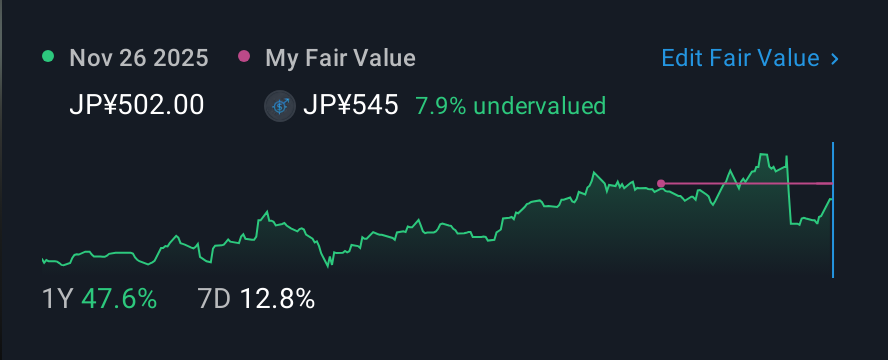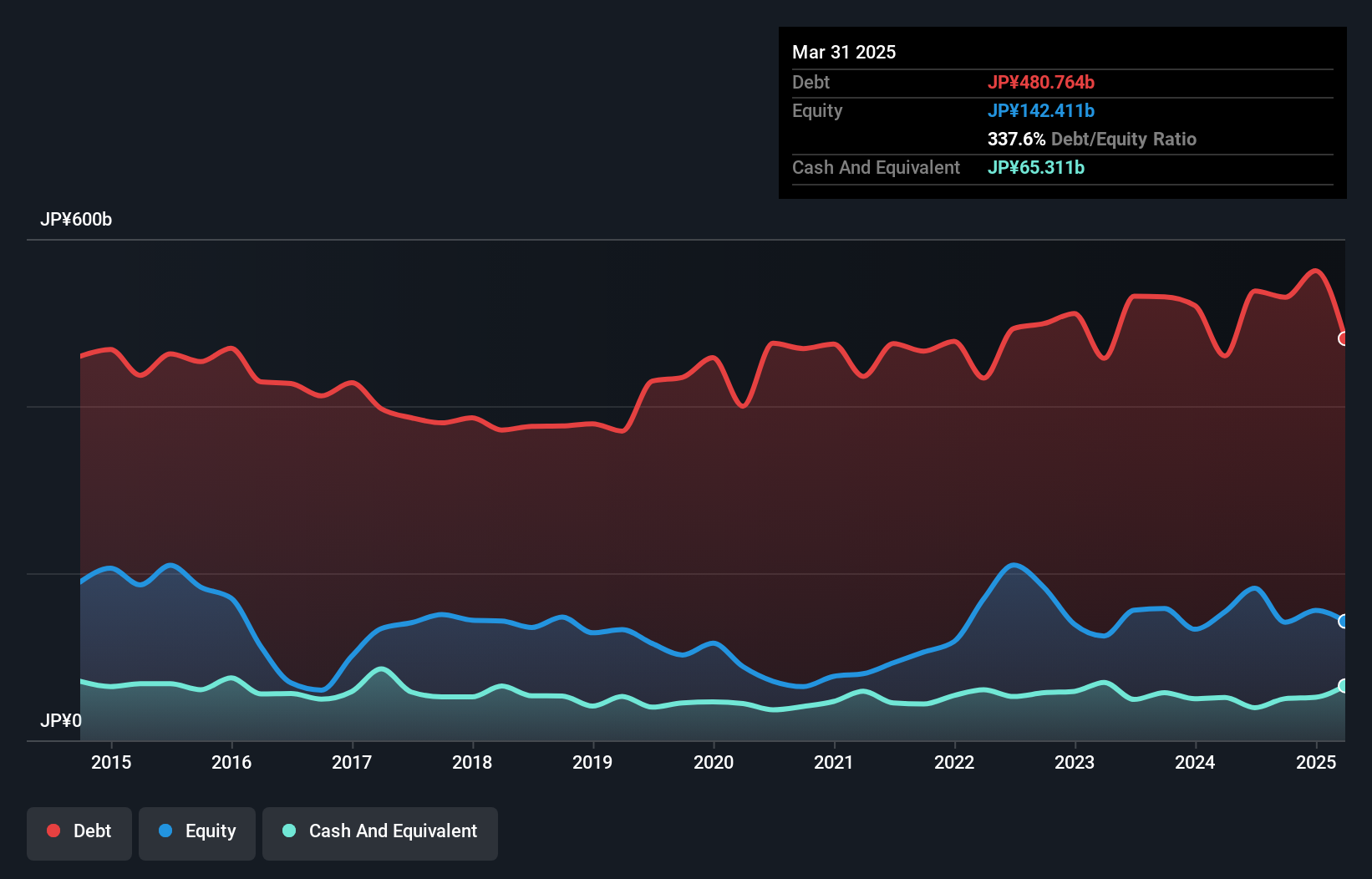Nippon Sheet Glass Company (TSE:5202) Use Of Debt Could Be Considered Risky

Legendary fund manager Li Lu (who Charlie Munger backed) once said, 'The biggest investment risk is not the volatility of prices, but whether you will suffer a permanent loss of capital.' So it might be obvious that you need to consider debt, when you think about how risky any given stock is, because too much debt can sink a company. As with many other companies Nippon Sheet Glass Company, Limited (TSE:5202) makes use of debt. But the real question is whether this debt is making the company risky.
When Is Debt Dangerous?
Debt and other liabilities become risky for a business when it cannot easily fulfill those obligations, either with free cash flow or by raising capital at an attractive price. Ultimately, if the company can't fulfill its legal obligations to repay debt, shareholders could walk away with nothing. However, a more usual (but still expensive) situation is where a company must dilute shareholders at a cheap share price simply to get debt under control. Of course, debt can be an important tool in businesses, particularly capital heavy businesses. The first thing to do when considering how much debt a business uses is to look at its cash and debt together.
What Is Nippon Sheet Glass Company's Net Debt?
As you can see below, at the end of March 2025, Nippon Sheet Glass Company had JP¥480.8b of debt, up from JP¥460.0b a year ago. Click the image for more detail. However, it does have JP¥65.3b in cash offsetting this, leading to net debt of about JP¥415.5b.

How Healthy Is Nippon Sheet Glass Company's Balance Sheet?
According to the last reported balance sheet, Nippon Sheet Glass Company had liabilities of JP¥408.2b due within 12 months, and liabilities of JP¥482.4b due beyond 12 months. Offsetting these obligations, it had cash of JP¥65.3b as well as receivables valued at JP¥86.4b due within 12 months. So its liabilities total JP¥738.8b more than the combination of its cash and short-term receivables.
This deficit casts a shadow over the JP¥53.8b company, like a colossus towering over mere mortals. So we'd watch its balance sheet closely, without a doubt. At the end of the day, Nippon Sheet Glass Company would probably need a major re-capitalization if its creditors were to demand repayment.
Check out our latest analysis for Nippon Sheet Glass Company
We use two main ratios to inform us about debt levels relative to earnings. The first is net debt divided by earnings before interest, tax, depreciation, and amortization (EBITDA), while the second is how many times its earnings before interest and tax (EBIT) covers its interest expense (or its interest cover, for short). The advantage of this approach is that we take into account both the absolute quantum of debt (with net debt to EBITDA) and the actual interest expenses associated with that debt (with its interest cover ratio).
Nippon Sheet Glass Company shareholders face the double whammy of a high net debt to EBITDA ratio (6.3), and fairly weak interest coverage, since EBIT is just 0.67 times the interest expense. The debt burden here is substantial. Even worse, Nippon Sheet Glass Company saw its EBIT tank 53% over the last 12 months. If earnings keep going like that over the long term, it has a snowball's chance in hell of paying off that debt. There's no doubt that we learn most about debt from the balance sheet. But ultimately the future profitability of the business will decide if Nippon Sheet Glass Company can strengthen its balance sheet over time. So if you're focused on the future you can check out this free report showing analyst profit forecasts.
Finally, a business needs free cash flow to pay off debt; accounting profits just don't cut it. So we always check how much of that EBIT is translated into free cash flow. In the last three years, Nippon Sheet Glass Company created free cash flow amounting to 2.7% of its EBIT, an uninspiring performance. For us, cash conversion that low sparks a little paranoia about is ability to extinguish debt.
Our View
To be frank both Nippon Sheet Glass Company's EBIT growth rate and its track record of staying on top of its total liabilities make us rather uncomfortable with its debt levels. And furthermore, its net debt to EBITDA also fails to instill confidence. Considering everything we've mentioned above, it's fair to say that Nippon Sheet Glass Company is carrying heavy debt load. If you play with fire you risk getting burnt, so we'd probably give this stock a wide berth. Even though Nippon Sheet Glass Company lost money on the bottom line, its positive EBIT suggests the business itself has potential. So you might want to check out how earnings have been trending over the last few years.
Of course, if you're the type of investor who prefers buying stocks without the burden of debt, then don't hesitate to discover our exclusive list of net cash growth stocks, today.
Valuation is complex, but we're here to simplify it.
Discover if Nippon Sheet Glass Company might be undervalued or overvalued with our detailed analysis, featuring fair value estimates, potential risks, dividends, insider trades, and its financial condition.
Access Free AnalysisHave feedback on this article? Concerned about the content? Get in touch with us directly. Alternatively, email editorial-team (at) simplywallst.com.
This article by Simply Wall St is general in nature. We provide commentary based on historical data and analyst forecasts only using an unbiased methodology and our articles are not intended to be financial advice. It does not constitute a recommendation to buy or sell any stock, and does not take account of your objectives, or your financial situation. We aim to bring you long-term focused analysis driven by fundamental data. Note that our analysis may not factor in the latest price-sensitive company announcements or qualitative material. Simply Wall St has no position in any stocks mentioned.
About TSE:5202
Nippon Sheet Glass Company
Engages in the manufacture and sale of glass and glass products in Europe, Asia, and the Americas.
Undervalued with moderate growth potential.
Similar Companies
Market Insights
Community Narratives


Recently Updated Narratives


MINISO's fair value is projected at 26.69 with an anticipated PE ratio shift of 20x


The Quiet Giant That Became AI’s Power Grid


Nova Ljubljanska Banka d.d will expect a 11.2% revenue boost driving future growth
Popular Narratives


The company that turned a verb into a global necessity and basically runs the modern internet, digital ads, smartphones, maps, and AI.


MicroVision will explode future revenue by 380.37% with a vision towards success



